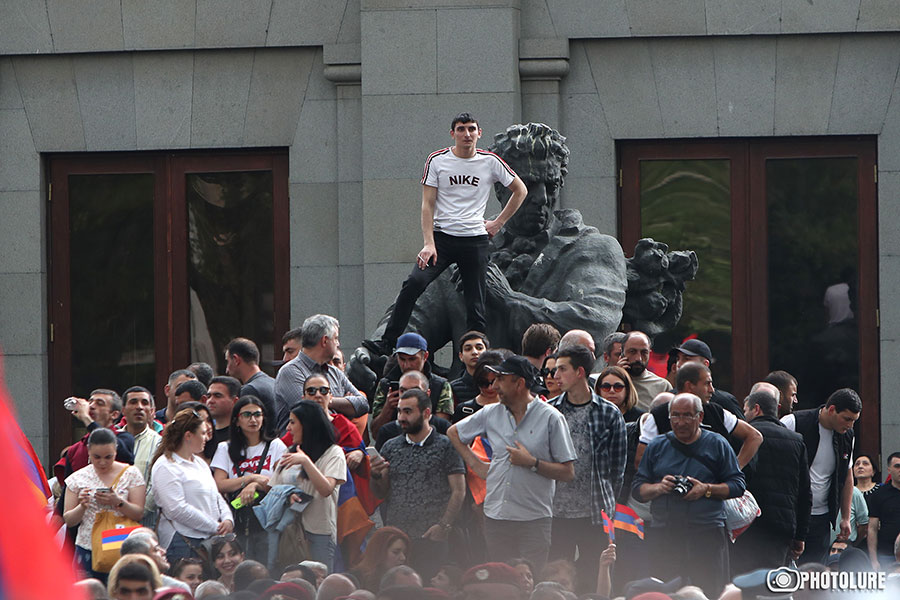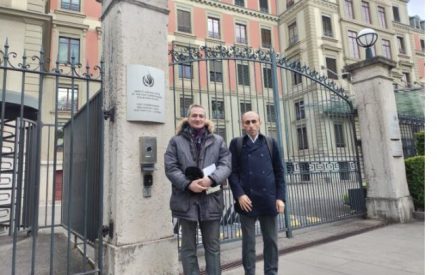by Raffi Kalfayan
Over the years, I have regularly warned about the threats to which Armenia was exposed due to the absence of national cohesion and strategy coupled with an exacerbation of internal divisions (see). The tragic results of these gross mistakes are known. They are continuing: we witness an uninterrupted process of unilateral concessions to establish peace at all costs with a neighbor that always demands more. How far is the Armenian government willing to go? The attempt to modify the constitution of the Republic of Armenia would be likely to deal a fatal blow if it materializes, because it would undermine the soul of this Republic, its identity, and would sever ties with the diaspora.
I support the need for constitutional reform, but not one that is destructive to the Armenian national identity but on the contrary, one which strengthens it, taking into account the diaspora and not forgetting the right to self-determination of the Armenian population of Artsakh or the history of the Armenian nation.
Read also
The Armenian nation-state, the homeland of all Armenians, is the only way to perpetuate the Republic of Armenia. To this end, I call on all components of the Armenian nation to resist the current project.
The Spirit of Resistance
Just recently, France honored the spirit of resistance during World War II by interring the remains of Missak Manouchian, a stateless foreigner and communist who took up arms against the Nazi occupiers of the country, which had refused him citizenship, in the Pantheon, the highest honor the country could bestow. He and his wife, Meline, and the 23 members of their storied Resistance group — all foreigners — were honored.
A sad irony of history, of course, is that the vast majority of Armenians have abandoned any spirit of resistance. The presence at the Manouchian ceremony of the Armenian head of state, who leads a government whose actions are precisely an uninterrupted series of concessions without resistance, was a paradox. Our Turkish and Azerbaijani neighbors will only sign a peace treaty when the Republic of Armenia renounces its national aspirations and its sovereignty.
Artsakh is the first victim of these concessions; it also fell without any resistance. The fall was total, with the Republic of Armenia not even anticipating the attack or offering safe passage to the enclave’s leaders, who instead were swiftly rounded up by Azerbaijani forces in gross violation of international law. They remain in prison, in some cases already convicted on a variety of egregious charges.
The consent of the Armenian government regarding the abandonment of Nagorno-Karabakh is no longer in doubt. The way the topic disappeared from its leaders’ comments as well as the thinly-veiled threats made against people and groups in Armenia who demand respect for the right to self-determination of the population of Nagorno-Karabakh, bear witness to this. More painfully, part of the diaspora also behaves as if the case were closed, while the refugees are still in a state of shock and living in precarious conditions.
The diaspora contributes to this headlong dive into oblivion by averting its eyes from the real problems. Some argue that the diaspora cannot decide for the citizens of Armenia while others, opportunists, blindly follow the government to gain political or personal advantages. Yet a third group is composed of those who refuse defeatism but do not put forward solutions capable of creating a unified national popular movement. As a result, the diaspora retreats into its own usual areas: positioning itself permanently as a victim, warning and lobbying about the external dangers facing the Republic of Armenia, doing humanitarian work, etc. This is laudable and useful in absolute terms, but it is also the mark of a lack of resistance to the Armenian government’s reckless trajectory: the destruction of the Nation-State project designed and adopted both by the founders of the First Republic of Armenia (1918) and by those of the Third Republic of Armenia (1991).
We can read opinions calling for the reorganization of the diaspora, or even a “constitution” for the diaspora, to support and promote national ideals independently of the Armenian government. This is unrealistic and ineffective. It should be remembered that our countries of residence have no use for our pan-Armenian aspirations. They only pay attention to subject-matters raised by the Armenian state. Two examples support this assertion. The first is over: the diaspora mobilized to defend the criminal conviction of Armenian genocide denial while the Armenian government defended freedom of expression in the antechambers of the European Court of Human Rights in concert with Turkey. The second is current: the diaspora is mobilized to defend the right to self-determination of the Armenians of Karabakh, while the Armenian rulers consider this subject closed. The governments of our countries of residence will always choose the minimalist position defended by the Armenian government.
The external threat, Azerbaijan, exists and poses a serious danger. However, the internal threat is no less dangerous; on the contrary, it is insidious because it emanates from the government of the Republic of Armenia. It could lead to the government reworking the constitution to eliminate all its historical references and national ideals, yet it is presented as a way to adapt to a new geopolitical environment.
Defining Constitution and Its Purpose
Not all states have a constitution in the sense of a single codified text, worded as such. The United States, France, and many other countries have codified constitutions, but the United Kingdom, Canada, Australia and Israel do not. Instead, they have a set of “fundamental laws” serving as a de facto constitution. The constitution is an essential document for any free nation to determine its social philosophy and translate it into visionary goals. It provides guidance on the functioning of the state in order to protect the rights and interests of its people.
The constitution lies at the intersection of the legal system, the political system and society. It is thus possible to identify two major constitutional archetypes: the procedural constitution and the prescriptive constitution. A procedural constitution defines the structure of public institutions and sets legal limits on government power in order to protect democratic processes and fundamental human rights. It contains little or no explicit mention of the formation of a nation or fundamental philosophical or ideological principles. By contrast, a prescriptive constitution highlights the founding role of the constitution as the “fundamental charter of the identity of the State,” which plays “a key role in the representation of the final objectives and shared values on which a State is established” (Lerner, 2011). It offers a collective vision of a society according to the shared values and aspirations of a homogeneous community. The successful implementation of a prescriptive constitution can positively impact nation-building efforts.
The preamble, which serves as an introduction, is an important part of the constitution because it defines the ideals of the people it represents. It is a statement summing up the primary reasons and objectives for the constitution, and sometimes refers to important historical events, national identity or values.
The founders of the Third Republic of Armenia took care to insert a preamble to the constitution which defines this national vision. The Armenian people take as their basis the fundamental principles and national goals of Armenian sovereignty established in the Declaration of Independence of Armenia. That one (adopted on August 23, 1990) is therefore the circumstantial and visionary basis of the Constitution (adopted on July 5, 1995).
The preamble reads: “Expressing the united will of the Armenian people; Aware of its historic responsibility for the destiny of the Armenian people engaged in the realization of the aspirations of all Armenians and the restoration of historical justice; Proceeding from the principles of the Universal Declaration on Human Rights and the generally recognized norms of international law; Exercising the right of nations to free self-determination; Based on the December 1, 1989, joint decision of the Armenian SSR Supreme Council and the Artsakh National Council on the “Reunification of the Armenian SSR and the Mountainous Region of Karabakh”; Developing the democratic traditions of the independent Republic of Armenia established on May 28, 1918.”
One can observe that all the historical references that define the Armenian nation-state and the aspirations of ALL Armenians are present there as well as the reaffirmation of the right of nations to self-determination. Article 11 of the Declaration adds the need to support efforts for the international recognition of the Armenian Genocide committed in the Ottoman Empire and Western Armenia.
The Armenian Constitution was inspired by the French Constitution of 1958 (French constitutionalists advised on its drafting). The preamble of the latter refers to historical references, that of the principles defined by the Declaration of the Rights of Man and of the Citizen of 1789 and that of the preamble of the Constitution of 1946, the principles of which are largely inspired by the program of the National Council of the Resistance on March 15, 1944 (program adopted before the liberation of France during WWII). The Council was headed by Charles de Gaulle, who delivered an inspired and historic speech in Bayeux (Normandy) on June 16, 1946. He outlined the new balance of powers which would be put in place in 1958, defending the existence of a strong and sovereign State (De Gaulle had always resisted bending to the will of United States to impose its views over France), guarantor of national unity, free from the play of political parties which is a source of divisions and paralysis.
The history of the French constitution, therefore, bears a strikingly relevant parallel to the situation in Armenia today, a country which desperately needs this spirit of resistance and of national unity transcending the political parties and outside influence, which currently is seeing the West tries to force Armenia to cut off its long-established and strategic relationship with Russia.
Armenian Constitution and New Geopolitical Circumstances
The government project to modify the constitution was born from demands from Azerbaijan; Prime Minister Nikol Pashinyan does not hide it. In fact, the parliamentary system is not called into question. Instead, the reference to the reunification of Nagorno-Karabakh with Armenia is targeted. The very fact that it was Armenia which initiated the debate on this subject is a gross mistake because its adversarial neighbors seized the opportunity to officially and publicly demand this new concession. The prime minister suggests without actually saying it that the signing of a peace treaty with Azerbaijan is conditional on the elimination of this reference in the Declaration of Independence.
It is paradoxical to note that he is the only Armenian leader to have affirmed that Artsakh is Armenia and yet he is now the one who wants to eliminate this ideal for the sake of honoring the hypothetical mutual respect for territorial integrity of with Azerbaijan on the basis of Soviet borders. Azerbaijan is not willing to accept Armenia’s sovereignty on this territorial basis. Today, it has taken over 170 square kilometers of Armenian soil. So, the question is: why abandon this legitimate and even legal objective?
Indeed, the constitutional act of independence of the Republic of Azerbaijan (October 18, 1991) and its diplomatic document to accession to the UN in 1992 go against the reasons put forward by the Armenian government to justify the political abandonment of Nagorno-Karabakh. In its article 2, the Declaration of Independence of Azerbaijan states that the Republic of Azerbaijan is the heir of the first Republic (May 28, 1918 – April 28, 1920). The act of independence does not delimit the territory. Article 3 states that the act annuls the USSR Treaty (December 30, 1922), rejecting by doing so its Soviet heritage, and thus recognizing itself as the heir of the Republic of 1918-1920. The Nagorno-Karabakh region is therefore automatically excluded from Azerbaijan’s territory. On November 30, 1920 the President of the Revolutionary Committee of Azerbaijan recognized Nagorno-Karabakh as part of Soviet Armenia. This was affirmed by the Caucasian Bureau of the Communist Party on July 4, 1921. Since Azerbaijan rejects all the decisions made by the Soviet Power, the decision of the same Caucasian Bureau to attach Nagorno-Karabakh to Azerbaijan on July 5, 1921 is null and void.
Hence, by putting forward the Alma-Ata Protocol’s provisions, marking the dissolution of the USSR, the Armenian executive sabotaged itself.
Will Turkey Demand Changes to Armenia’s Constitution?
Tomorrow, Turkey could also officially request from Armenia (some Turkish politicians started to do it), a modification of the RA Constitution because the Declaration of Independence contains a reference to the genocide in Western Armenia (see article 11).
It is useful to recall that the Armenian Constitutional Court ruled on the Armenian-Turkish Protocols signed in Zurich in October 2009. By a decision of January 12, 2010, the court considered that the provisions of the Protocol “on the development of relations between the Republic of Armenia and the Republic of Turkey” in the legislation and legal practice of the Republic of Armenia, as well as in interstate relations, cannot be interpreted and applied in a manner that contradicts the provisions of the preamble of the Constitution of the Republic of Armenia and the Declaration of Independence of Armenia, nor the requirements of Article 11 of the Declaration of Independence.
The Constitutional Court underwent a re-composition of its members as part of a takeover of judicial power by the ruling party in Armenia. The latest example illustrating the violation of the principle of separation of powers is that of the appointment of Judge Davit Balayan by the General Assembly of Judges to fill a vacant position on the Constitutional Court. Parliament, where the Civil Contract party of Pashinyan has a two-thirds majority, refused this appointment, even though it had been decided by an overwhelming majority of the General Assembly of Judges. It seems, therefore, that the Constitutional Court is being molded to follow the instructions of the Executive.
To Modify the Declaration of Independence Cancels Independence
Since when does a state rewrite its constitution based on the injunctions of its neighbors? Such an operation would be a contrary to the principles of sovereignty and national interests. The very debate around this possible concession can have disastrous consequences on the foreign and judicial policy currently being pursued by the RA ministry for foreign affairs and the Agent of the Government for legal affairs. Both aim to consolidate legally and diplomatically the right of return of the Armenian population of Artsakh to their land. The inconsistency at the top of the State, whether conscious or not, is a national disaster. After the abandonment of Artsakh by coercion, this would be the definitive burial of the right to self-determination of the Armenian people of Artsakh.
A state can be formed on the simple basis of a declaration of independence, and this serves as fundamental law. It is this document which establishes national sovereignty vis-à-vis its former administrators or colonizers. This was the case of the Declaration of Independence of the United States in 1776: “The Unanimous Declaration of the Thirteen United States of America and United States Declaration of Independence” vis-à-vis Great Britain. The United States Constitution was not adopted until 1787.
This is also the case in Israel, where several fundamental laws constituting the State of Israel were adopted. The Declaration of Independence of the State of Israel in 1948 from its British proxy remained the only “constitutional” text until 1958.
Although the author does not subscribe to recent Israeli fundamental laws which are totally contrary to the principles of international law and the resolutions of the United Nations, the fact remains that they illustrate in a relevant manner what is a nation-state independently on the notion of territory.
Most Armenians like to cite Israel as an example of a successful small state. The State of Israel was formed to bring together a nation and represent its ideals. The territory of Israel is not defined in any official document. The only document where it is defined is the Charter of Likud, a right-wing party, heir to the revisionist Zionist party created in 1925 which wants to establish a Jewish state on both banks of the Jordan river, including the former Palestine territory under British Mandate (that includes Gaza), and Jordan (that includes the West Bank and East Jerusalem). Prime Minister Benjamin Netanyahu, the current leader of Likud, is unveiling this project before our eyes.
In 2018, the Israel Law, Nation State of the Jewish People modified the principles of the Declaration of Independence in that it recognizes Israel as a Jewish state and Hebrew as the only official language (an apartheid regime because it establishes a double discrimination based on national and religious differences). As for the rest, it continues the philosophy of the 1948 Declaration, where Israel is defined as the historical homeland of the Jewish people, in which the State of Israel was established. It proclaims that: The State will do everything to ensure the security of members of the Jewish people in danger or in captivity, due to their Jewishness or their citizenship, will act with the Diaspora so as to strengthen the links between the State and the members of the Jewish people; and will act to preserve the cultural, historical and religious heritage of the Jewish people among Jews in the Diaspora. The 1948 Declaration ends with a reference to the “the realization of the age-old dream – the redemption of Israel.” What was utopia has become reality.
It therefore appears from the declarations of independence of both Israel and Azerbaijan that these constitutive acts of the State do not define the territories. Both states have clearly expansionist goals. The Armenian government’s policy of peace-making at any cost with Azerbaijan is unlikely to succeed under these circumstances.
Risk of Exclusion of Diaspora Is High
The most serious consequence of amending the Armenian constitution would be the abandonment of the dreams and goals of the Armenian nation. Purging the constitution of all its historical references which concern the entire nation is to endanger the very existence of Armenia because it will limit the definition of the Armenian state to the population residing within the borders of the Republic of Armenia and exclude the rest of the Armenian nation.
Two commentators on this project highlight the inconsistencies and risks of this project. Artak Beglaryan, former state minister of Artsakh, considers it very dangerous because it artificially pits the national interest and the interest of the state, when in reality they are complementary. The state is the core and citadel of the nation. Furthermore, it removes the national responsibility of the state towards the 75 percent of the nation (diaspora and Artsakh) which lies outside the formal borders of the state. The project destroys the ideological principles and symbols which constitute the basis of national identity and it considerably weakens the level of resistance of the nation and even the consolidation of the people. Vahan Zanoyan (See “Defining Nation and State,” Armenian Mirror, February 1, 2024) traces the historical journey of the Armenian nation and the formation of the State and recalls that the nation had a permanent existence while it is not true for the state. It survived without a state for most of its history. During the centuries when there was no Armenian state, it was the nation, with its unshakable attachment to its culture, language, literature, faith, traditions, historical heritage, collective memory and resolute awareness of its own history, which kept alive the hope and prospect of an eventual state.
Moreover, it is this hope and the ideal of independence that made it possible to resist 70 years of communism and prevent the destruction of national ideology and values.
The abandonment of the nation-state would deal a demographic final blow to an Armenia already plagued by high emigration. The refugees from Artsakh will also increase the flow of emigration because they are unable to return home. If Armenia no longer represents the aspirations of the entire Armenian nation, what is the point for Armenians in the diaspora to invest in it or settle there? Current citizens and residents of Armenia themselves would have much better options outside the Republic of Armenia. Indeed, if the only goals are peace and economic prosperity, then they can better pursue them in Europe, the United States, Canada or even some Middle Eastern states.
If a state is to be built, it is a nation-state with a strong ideology and identity representative of the aspirations of the entire Armenian nation. The strong trend throughout the world, in the United States as in most European countries, as well as in Russia, Turkey and Azerbaijan, is rather towards the strengthening of national objectives and identities. The Armenian government project, going against this trend, would announce the self-destruction of the Republic of Armenia.
The prime minister recently discussed the need for state building, claiming that one did not exist today. This state has existed since 1918 but its servants no longer exist. Service to the state must take precedence over political and individual interests and privileges. Armenia has lacked servants and statesmen since gaining independence in 1991. The hopes placed in the new generations have been dashed. On the contrary, those in power seem to be even less capable of serving the state than the former Soviet cadres. The constitutional modification, if it were to take place, would in no way diminish the claims of our warlike neighbors, but would certainly accelerate the loss of a state, the homeland of all Armenians. Losing this nation-state created by the survivors of the genocide would complete it.
The urgency is to resist and fight against this project, to neutralize it by preventing the political force in power and its “lider maximo” to achieve it. For this, it will be necessary to defeat the referendum for a new Constitution, if it ever takes place, and to develop an alternative project, supported by all the political forces who wish to protect the Armenian dreams and restore national dignity and sovereignty. A Pan-Armenian Council of Resistance with a realistic Charter should be created immediately. I am ready to coordinate and consolidate the efforts in this direction.
(Philippe Raffi Kalfayan, based in Paris, is a lawyer, lecturer in international law and a former secretary general of FIDH (International Federation of Human Rights), who has earned a PhD in international law. He is a regular columnist for the Armenian Mirror-Spectator.)























































